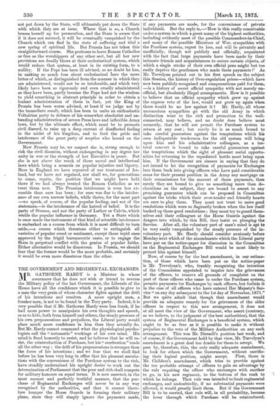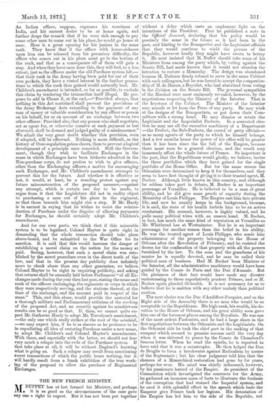THE GOVERNMENT AND REGIMENTAL EXCHANGES.
-TUR. GATHORNE HARDY is a Minister in whose irt assurances that he does not wish or intend to reverse the Military policy of the last Government, the Liberals of the House have all the confidence which it is possible to give to a man the very grain of whose character fights against the drift of his intentions and resolves. A more upright man, a franker man, is not to be found in the Tory party. Indeed, it is very possible that if Mr. Gathorne Hardy were less frank, if he had more power to manipulate his own thoughts and speech, so as to hide, both from himself and others, the steady pressure of his own prepossessions and prejudices, the Liberal party would place much more confidence in him than they actually do. But Mr. Hardy cannot command what the physiological psycho- logists call the "automatic" workings of his own mind. His mind is fixed honestly to resist, and he believes that he will re- sist, the reintroduction of Purchase, but his" cerebration" tends all the other way ; the drift of his prepossessions is stronger than the force of his intentions ; and we fear that we shall find before he has been very long in office that his pleasant associa- tions with the convenience of the Purchase system to the rich, have steadily undermined his upright desire to work out the determination of Parliament that the poor and rich shall compete for military honours on equal terms. It is now asserted, in the most earnest and perfectly truthful manner, that the pur- -chase of Regimental Exchanges will never be in any way recognised by the authorities, and that it cannot there- lore hamper the Horse Guards in forming their military plans, since they will simply ignore the payments made,
if any payments are made, for the convenience- of private individuals. But the reply How -is this really conceivable under a system in which a great many of the highest authorities, including evidently most of the possible Commanders-in-Chief, and many of the possible -Mmisters of War, sympathise with the Purchase system, regret its loss, and will be privately and unofficially, though not publicly and officially, acquainted with the fact that large payments have been made by their intimate friends and acquaintances to secure certain objects, of which a single stroke of their own official pens might but too easily deprive the gentlemen who made these payments ?' As Mr. Trevelyan pointed out in his first speech on the subject this Session, the history of Over-regulation prices—which have now been publicly recognised and compensations paid for them, —is a history of secret official sympathy with not merely un- official, but absolutely illegal arrangements. How is it possible to believe that an official sympathy which grew up against the express veto of the law, would not grow up again when- there would be no law against it ? Mr. Hardy, all whose unconscious sympathies go with the old Army in which distinction went to the rich and promotion to the well- connected, may believe, and no doubt does believe most earnestly, that he will not permit the Purchase system to return at any cost ; but surely he is as much bound to take careful guarantees against the temptations which his- own indisputable tenderness for the old system will bring upon him and his administrative colleagues, as a tee- total convert is bound to take careful guarantees against the temptations which the sight of pleasant social opportu- nities for returning to the repudiated bottle must bring upon him. If the Government are sincere in saying that they do not intend to let the recognition of payments for Exchanges lure them back into giving officers who have paid considerable sums for their present position in the Army any mortgage on their commissions for the amount of these payments, then surely they are bound to give us something more than de- clarations on the subject, they are bound to assent to any promising guarantee which can be proposed in Committee against the tricks which their over-tender and friendly hearts are sure to play them. They must not trust to _mere good resolutions which were so flagrantly broken when the law itself backed up those good resolutions ; they must try to guard them- selves and their colleagues at the Horse Guards against the dangers into which, by this Bill, they insist on plunging the Service.- After all, the voluntary part of man's mind is apt to be very easily vanquished by the steady pressure of the in- voluntary part. Mr. Hardy should consider anxiously before Monday next which of the amendments which the Liberal party have put on the notice-paper for discussion in the Committee on the Regimental Exchanges Bill would be most likely to protect him against himself.
Now, of course by far the best amendment, in our estima- tion, of those which have been put on the notice-paper is Mr. Trevelyan's, who, frankly recognising the intention of the Commission appointed to inquire into the grievances of the officers, to remove all grounds of complaint on the part of those officers who came in under the Purchase system, permits payments for Exchanges by 'Such officers, but forbids it in the case of all officers who have entered Her Majesty's Ser- vice "on any day subsequent to the- 1st day of November, 1871." But we quite admit that though that amendment would provide an adequate remedy for the grievances of the older officers in respect to this new arrangement, it does not at all meet the view of the Government, who assert -(contrary, as we believe, to the judgment of the best authorities), that the system of Regimental Exchanges is a beneficial system, which ought to be as free as it is possible to make it without prejudice to the veto of the Military Authorities on any such arrangement. This was Mr. Disraeli's position last week, and of course, if the Government hold by that view, Mr. Trevelyan's amendment is a great deal too drastic for them to accept. We pass by, therefore, this, the only really adequate amendment, to look for others which the Government, without sacrific-
ing their logical position, might accept. First, there is Mr. Childers's amendment, which tries to provide against the too probable attempt of officers to gain an advantage by the rule requiring the officer who exchanges with another to go, in his new regiment, to the bottom of the rank to which he belongs. That rule was intended to limit regimental exchanges, and undoubtedly, if no substantial payments were allowed, it would greatly limit them. But if the Government Bill is to be carried, that rule will, in all probability, become the lever through which Purchase will be reintroduced. India, and his earnest desire to be at home again, and further drops the remark that if he were rich enough to pay some other man to come out in his place, he would go home at once. Here is a great opening for his juniors in the same rank. They know that if the officer with home-sickness upon him can be released from his pecuniary difficulty, the officer who comes out in his place must go to the bottom of the rank, and that as a consequence all of them will gain a step. And when they have once done this, they will feel, to a less extent. just as the officers under the old Purchase system felt,— that their rank in the Army having been paid for out of their own pockets, they have a vested interest in the further promo- tions to which the rank thus gained would naturally lead. Mr. Childers's amendment is intended, so far as possible, to exclude this claim by rendering the transaction itself illegal He pro- poses to add in Clause 2, at the end,—" Provided always, that nothing in this Act contained shall prevent the provisions of the Army Brokerage Acts extending to the payment of any sum of money or valuable consideration by any officer or person on his behalf, for or on account of an exchange between two other officers: Provided also, that any person who shall negotiate, act as agent for, or otherwise connive at such payment as last aforesaid, shall be deemed and judged guilty of a misdemeanor." We admit the very great doubt whether this provision, even if adopted, will be effectual. Nothing is more difficult, as the history of Over-regulation.piices shows, than to prevent a logical development of a principle once conceded. Still the Govern- ment, though they wish to facilitate Exchanges in the sense in which Exchanges have been hitherto admitted in the Non-purchase corps, do not profess to wish to give officers, other than the Exchanging officers, a motive for encouraging such Exchanges, and Mr. Childers's amendment attempts to prevent this for the future. And whether it is effective or not, it would, at least, be a standing protest against any future misconstruction of the proposed measure,—against any attempt, which is certain one day to be made, to argue from it that the Legislature did not in reality object to purchasing a man out of his place in the regiment, so that those beneath him might rise a step. If Mr. Hardy is in earnest in saying that he wishes to resist the reintro- duction of Purchase under the disguise of allowing payments for Exchanges, he should certainly adopt Mr. Childers's amendment.
And for our own parts, we think that if this miserable system is to be legalised, Colonel Hayter is quite right in demanding that the whole transaction should take place above-board, and be submitted to the War Office for its sanction. It is said that this would increase the danger of establishing a moral claim on the nation for the money so paid. Seeing, however, that such a moral claim was esta- blished by the secret procedure even in the direct teeth of the law, and that in the present day publicity doe,a infinitely more to check abuse than any other guarantee, we believe Colonel Hayter to be right in requiring publicity, and asking that returns shall be annually laid before Parliament "of all Ex- changes made during the year then last past, stating the name and rank of the officers exchanging, the regiments or corps in which they were respectively serving, and the stations thereof, at the time of the exchange, and the amount paid in respect of the same." This, and this alone, would provide the material for a thorough military and Parliamentary criticism of the working of the proposed Act, and no security against its mischievous results can be so good as that. If, then, we cannot quite ex- pect Mr. Gathorne Hardy to adopt Mr. Trevelyan's amendment, —the only one which really strikes at the root of the mischief, —we may expect him, if he is as sincere as he professes to be in repudiating all idea of restoring Purchase under a new name, to adopt Mr. Childers's and Colonel Hayter's amendments. With these, and especially with the latter, we should not fear very much a relapse into the evils of the Purchase system. If that take place at all, it will be without England's knowing what is going on. Such a relapse may result from sanctioning
Secret transactions of which the public hears nothing, but it will hardly result from a frank exhibition of the true work- ing of the proposal to allow the purchase of Regimental Exchanges.



































 Previous page
Previous page